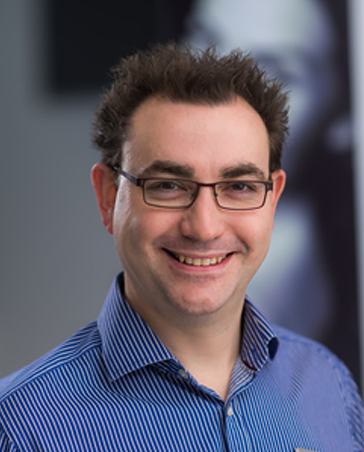Dr Joel Newman, Haematologist

Can you tell us what your average day involves?
My day begins at 8am. Working in this specialty is relatively unique in that I work both in the hospital laboratory looking at the tests sent not only for my own patients, but also for those across the hospital; and I also work on the wards and in the outpatients department looking after patients with blood disorders. As a result, my days are very varied, but usually start with taking my children to school and nursery, before heading to my desk to deal with any correspondence and to look at any worrying blood films that were made from blood samples overnight.
Mornings usually then involve either heading to the outpatients department to see new patients and those returning for monitoring, or visiting the ward to do bone marrow tests on inpatients or those attending our day ward. Most afternoons involve seeing more patients on the ward as a formal ward round, or in the day unit, to discuss their diagnosis and plan their treatment.
Why did you choose this specialty?
I was fortunate enough to work under Dr Richard Grace, a consultant haematologist in Eastbourne, who helped me understand the complex nature of blood disorders, and who really leads by example when it comes to excellent patient care. I found haematology to be a specialty where you could form rewarding professional relationships with your patients, where many treatments and diagnostic tests were at the cutting edge of medicine, where you could both diagnose and treat patients yourself, bridging the gap between the hospital and the laboratory.
What many people don’t realise is the extent to which other specialties rely on haematologists for advice, which ends up with the haematologist knowing nearly all the other doctors in the hospital, making it quite a sociable specialty! Some of the conditions that we treat as haematologists are very obscure, and one of the privileges of the specialty is that we are often asked by our colleagues for advice when their patients present with unusual symptoms, or where the diagnosis is not entirely clear. This can be both enjoyable but also challenging and mentally stimulating.
What do you enjoy most about your job and specialty?
As already mentioned, in haematology you get to know your patients well, sharing in their highs and lows, tailoring their treatment to their own personal circumstances. This privilege can be very rewarding, but can also make it tough when people don’t do as well as you had hoped. Haematology is also very varied from day-to-day, and you can get involved in aspects of medicine, surgery, obstetrics, paediatrics and more, meaning that you are constantly being updated in all fields of medical practice.
What's a highlight of your role?
In the field of haematology I have been able to help teach medical students, lecture to the general public at Gresham College, act as a representative for trainees in both London and the South East with the London Deanery, and the rest of the UK with The Royal College of Pathologists. A career in medicine can be very varied and rewarding!
Do you take part in other activities that allow you to share and explore your skills and knowledge?
Working in all branches of medicine there are numerous opportunities to get more involved in one’s specific specialty or other topics such as medical education. I have been lucky enough to get involved in medical education through the Royal Society of Medicine, and as an Advanced Life Support Instructor for the Resus Council.
I have also had the opportunity to write a large portion of an undergraduate textbook (100 Cases for Medical Data Interpretation), and get involved as a Deputy Editor for the Journal of Medical Case Reports.
What advice would you give to students looking to enter your field?
Don’t be put off by the thought of working in the laboratory – it’s a fascinating place to work, and gives you great insight into investigating illnesses and managing them. You also only spend around 10% of your time there – the remainder being mostly direct clinical care.
To be a haematologist you need to be a good communicator, and be able to develop a rapport with your patients, but you also need to have a good scientific mind to be able to understand the science behind blood disorders, and the science behind the ever-expanding list of treatments available.
It is an extremely rewarding career, and is perfect for those who enjoy many different medical specialties, but are not keen to continue the general medical on-calls. As a specialty it also lends itself well to less than full time training.
